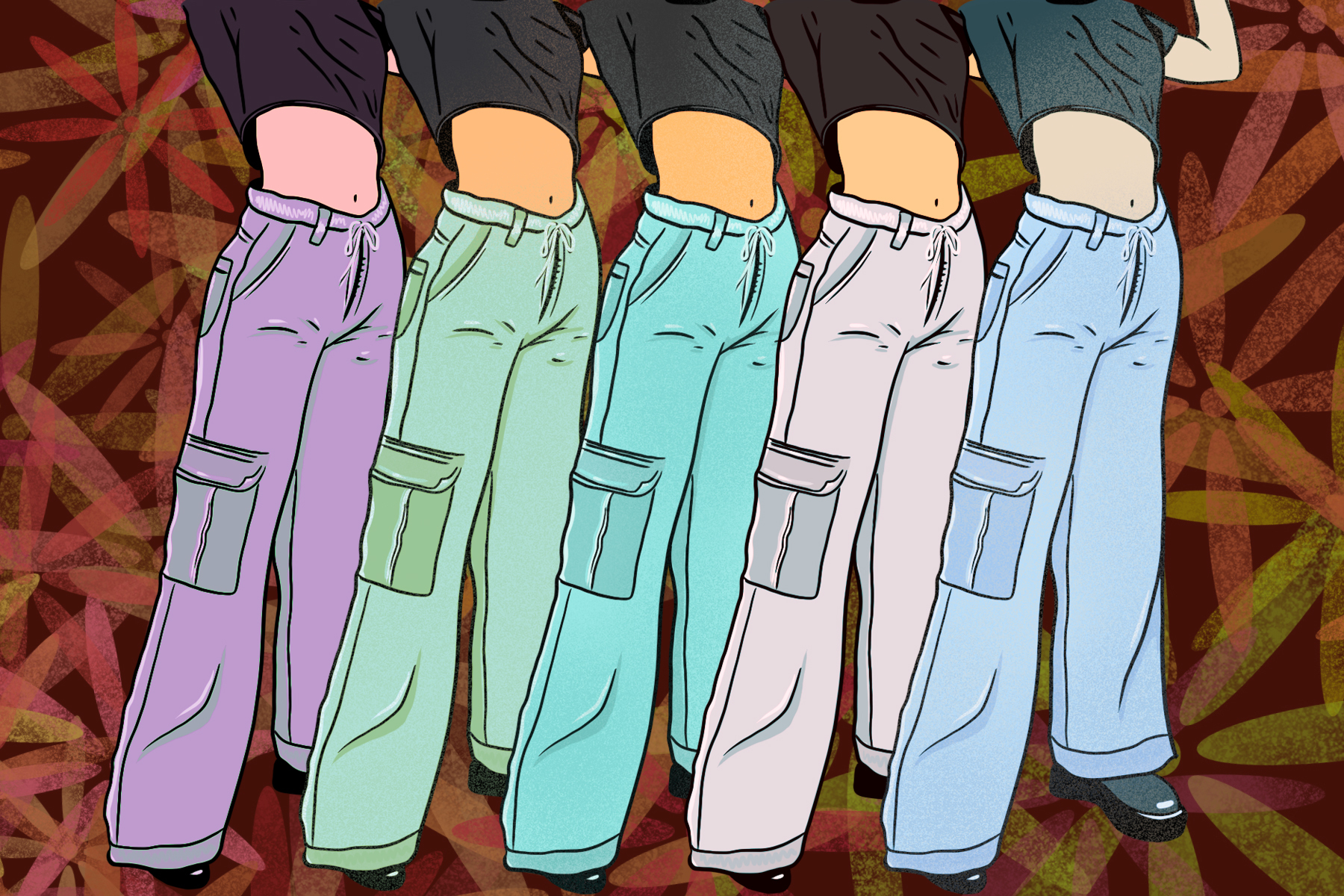From effortless monochrome to colorful vintage, streetwear continues to be the most pervasive trend among college-age people — which may be one big blessing in the disguise of questionable cargo pants and unwieldy sneakers. The blessing is the marriage of effortless cool and practical comfort. I consider myself quite lucky to have been a college student in an era in which sneakers, slacks and a sweater weren’t outside the realm of everyday fashion. In the world of women’s streetwear, YouTubers like Clothesnbits showcase how streetwear can be incorporated into everyday university outfits, or even be a means of serving looks in sub-zero temperatures.
Perhaps for women, in particular, the cultural embrace of a new androgynous style is a welcome change. I have hopes that the comfort of streetwear will find its way into the workplace, with multicolored blazers and all yellow sneakers, where the days of nylons and heels seem to be far over anyway. The need for uncomfortable, formal workwear might even become more obsolete because of the shift from office to home that is poised to become a more widespread working reality post-COVID-19. Streetwear is the voice of a generation that is both fed up with discomfort and deeply entrenched in hip-hop culture, and the trend will likely have lasting implications as young people enter the workforce.
But at what point does streetwear become less about comfort, versatility and inclusivity, and more about pride, branding and exclusivity? Behind the practicality of sweatpants and puffy winter jackets, there is also an unspoken undercurrent of ego. It is not a secret that streetwear and branding seem to go hand-in-hand, and when branding is the central feature of fashion, inclusivity and creativity have to take a backseat.
I personally believe that it is only in the spirit of Kanye West and expensive exclusivity that anyone would ever think about donning a pair of Yeezys — which are quite possibly one of the top five biggest sneaker monstrosities ever to gain a foothold in fashion. It is only through exclusivity that abject ugliness in fashion is accepted without question. When the Supreme logo is more important than the actual quality of the clothing, a world of opportunity for experimentation, thrifting and expansion into the artistic realm of fashion are all lost. The moment streetwear becomes all about an ego boost, it’s time for a re-evaluation.
To understand the plight of streetwear, I think it is first important to understand the root of what makes fashion plummet from a fun, lighthearted creative endeavor to a process that is imbued with a need for recognition, a need for a heavy price tag and an endless need for more.
My theory as to why brand, ego and clout have become so intertwined with streetwear is that, for many, being a young person also comes along with an almost obsessive need to create a self. There is a compulsion, an underlying need for the stability that comes along with a stable identity that is recognized as legitimate by others. From this perspective, a Supreme T-shirt seems like an almost acceptable stand-in for a healthy sense of self.
But the fundamental problem arises when identity and fashion become intertwined — when clothes become the determining factor of who you think you are. Because as soon as material things become imbued with a sense of personal identity, fashion becomes less about play, less about creativity and more about trying to maintain a heavy sense of self to both oneself and the world.
So for all of those people who are trying to create a self that they can accept by waiting in line outside of the Supreme store, or posting videos online about owning more shoes than one person could possibly wear in a year, it is time to acknowledge that the pursuit of material things for the purpose of identity creation just doesn’t work. Fashion retailers love the sense of lack that comes with materialism and the need to have more and ultimately be more. They love it for the precise reason that the sense of satisfaction is temporary, followed by the need for another trendy thing, and another.
The fact of the matter is that streetwear doesn’t have to be that serious, and it doesn’t have to be that heavy. The realization that the clothes that you put on your body don’t have much to do with who you essentially are makes fashion freeing.
There are many viral videos on TikTok that feature high school-aged girls who can’t decide on a certain style. “Sometimes I want to be this girl,” the voice-over declares as the TikTokker poses in black leather pants and army boots. “But sometimes I want to be this girl” and a flowy dress appears.
But the good news is that there is no rule that says that you are an essentially different person according to what clothes you choose to put on your body on any given day. Sure, there are cultural connotations, as well as limitations in terms of practicality and comfort. But what is fun about streetwear (and fashion in general) is that it doesn’t have to define who you are. Therefore, to all of the TikTokkers out there, you can “be” both, and all of “those girls,” and it totally doesn’t matter. No need to overthink, categorize and criticize.
The key, I think, to overcoming the ego-driven exclusivity of streetwear and the compulsion to exclusively follow trends is to end self-seeking in clothing and thus end the absolute seriousness of it. Fashion is a game, after all, and for the most part, the streetwear community seems to acknowledge this. Wearing so-called “dad shoes” and making them into a fashion statement shows that fashion and streetwear can’t be taken too seriously.
The comfort of sneakers and sweaters is a bonus of the trend. But the real merit of streetwear, I think, comes along when people start to wear pieces ironically, or start wearing pieces that just speak to them for no real reason. This is play. This is creativity. This is not taking life or fashion too seriously. This is what makes streetwear inclusive.


















Absolutely agree! Streetwear is all about self-expression and having fun with fashion. It’s not about rigid rules or taking yourself too seriously.